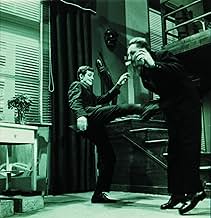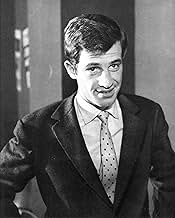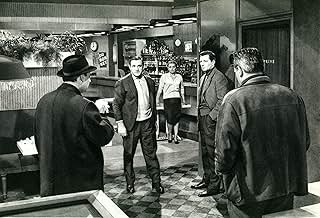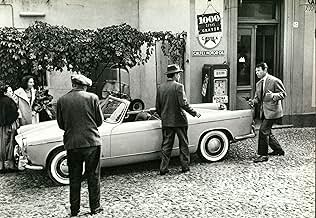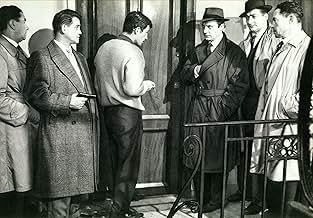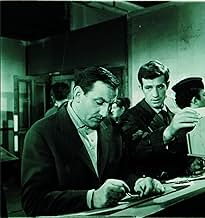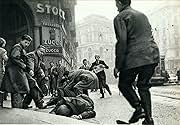ÉVALUATION IMDb
7,5/10
4,8 k
MA NOTE
Ajouter une intrigue dans votre langueA ruthless criminal flees from the pursuit, involving more and more casualties.A ruthless criminal flees from the pursuit, involving more and more casualties.A ruthless criminal flees from the pursuit, involving more and more casualties.
Simone Desmaison
- Thérèse Davos
- (as Simone France)
Jean-Pierre Zola
- Le patron de l'agence privée
- (as J.P. Zola)
Philippe March
- Jean Martin
- (as Aimé de March)
Avis en vedette
10Dziga7
I saw this film at Telluride Film Festival in 1997, where one of the screenwriters, José Giovanni, was being honored. It ranks highly as a great noir-crime-drama, incredible performances by Belmondo and Lino Ventura. The attention given to every character, and complex psychological portrayals, detailing loyalty, treachery, love, and hope, are tremendous. It is an excellent drama, an excellent thriller, and an excellent film. Up there with the best of Melville. (The title in English 'Class all risk,' in French 'Classe tous risques' is word-play on 'Classe Touriste,' meaning 'Tourist Class'.
"Classe tous risques" feels like the granddaddy of "The Sopranos" in mixing the criminal and the domestic, and of the buddy film to feel as contemporary as "Reservoir Dogs."
Even as these gangsters are affectionately entangled with wives, children, lovers and parents, they are coldly ruthless, and we are constantly reminded they are, no matter what warm situation we also see them in. They can tousle a kid's hair - and then shoot a threat in cold blood. The key is loyalty, and the male camaraderie is beautifully conveyed, without ethnic or class stereotypes, even as their web of past obligations and pay backs narrows into suspicion and paranoia, as the old gang is in various stages of parole, retirement, out on bail or into new, less profitable ventures. An intense accusation is of sending a stranger to perform an old escape scenario. It is a high point of emotion when a wife is told off that she's not the one the gangster is friends with, while virtually the only time we hear music on the soundtrack is when he recalls his wife.
Streetscapes in Italy and France are marvelously used, in blinding daylight to dark water and highways, from the opening set up of a pair of brazen robbers -- who are traveling with one's wife and two kids. Rugged, craggy Lino Ventura captures the screen immediately as the criminal dad. And the second thug is clearly a casually avuncular presence in their lives, as they smoothly coordinate the theft and escape, in cars, buses, on boats and motorcycles, in easy tandem. This is not the cliché crusty old guy softened with the big-eyed orphan; these are their jobs and their families and they intersect in horrific ways.
The film pulls no punches in unexpectedly killing off characters, directly and as collateral damage, and challenging our sympathy for them, right through to the unsentimental end, which is probably why there was never an American remake.
It seems so fresh that it's not until Jean-Paul Belmondo enters almost a third of the way into the film, looking so insouciant as a young punk, that one realizes that this is from 1960. Sultry Sandra Milo has smart and terrific chemistry with him, from an ambulance to an elevator to a hospital bed.
While the Film Forum was showing a new 35 mm print with newly translated subtitles, it was not pristine. The program notes explained that the title refers to a kind of insurance policy and is pun on "tourist class."
Even as these gangsters are affectionately entangled with wives, children, lovers and parents, they are coldly ruthless, and we are constantly reminded they are, no matter what warm situation we also see them in. They can tousle a kid's hair - and then shoot a threat in cold blood. The key is loyalty, and the male camaraderie is beautifully conveyed, without ethnic or class stereotypes, even as their web of past obligations and pay backs narrows into suspicion and paranoia, as the old gang is in various stages of parole, retirement, out on bail or into new, less profitable ventures. An intense accusation is of sending a stranger to perform an old escape scenario. It is a high point of emotion when a wife is told off that she's not the one the gangster is friends with, while virtually the only time we hear music on the soundtrack is when he recalls his wife.
Streetscapes in Italy and France are marvelously used, in blinding daylight to dark water and highways, from the opening set up of a pair of brazen robbers -- who are traveling with one's wife and two kids. Rugged, craggy Lino Ventura captures the screen immediately as the criminal dad. And the second thug is clearly a casually avuncular presence in their lives, as they smoothly coordinate the theft and escape, in cars, buses, on boats and motorcycles, in easy tandem. This is not the cliché crusty old guy softened with the big-eyed orphan; these are their jobs and their families and they intersect in horrific ways.
The film pulls no punches in unexpectedly killing off characters, directly and as collateral damage, and challenging our sympathy for them, right through to the unsentimental end, which is probably why there was never an American remake.
It seems so fresh that it's not until Jean-Paul Belmondo enters almost a third of the way into the film, looking so insouciant as a young punk, that one realizes that this is from 1960. Sultry Sandra Milo has smart and terrific chemistry with him, from an ambulance to an elevator to a hospital bed.
While the Film Forum was showing a new 35 mm print with newly translated subtitles, it was not pristine. The program notes explained that the title refers to a kind of insurance policy and is pun on "tourist class."
10urigafni
Odd one should be able to stumble into "Classe Tous Risques" only by chance; it should be on any "best of film-noir" list, including IMDb's.
Lino Ventura is as good as ever; knowing of his dire, delicate family situation gives extra weight to his almost expressionless face and brief dialogues. Belmondo's restrained performance under Sautet's firm direction only shows what a wonderful actor he could - and should -have been.
"Classe Tous Risques" is utterly mininal, dry and cold, without Melville's artistic scenery, pretty faces and fancy cars. It is almost film-noir meet neo-realism. Davos' few, hard words to his children describing their life of secrecy from there on get a hold on your throat to the end of the film.
The final sentence of the film - a voice-over telling of Davos' end in no more than ten dry, sombre words - leaves you with a hard punch in the stomach.
A true jewel in the great crown of French film-noir.
Lino Ventura is as good as ever; knowing of his dire, delicate family situation gives extra weight to his almost expressionless face and brief dialogues. Belmondo's restrained performance under Sautet's firm direction only shows what a wonderful actor he could - and should -have been.
"Classe Tous Risques" is utterly mininal, dry and cold, without Melville's artistic scenery, pretty faces and fancy cars. It is almost film-noir meet neo-realism. Davos' few, hard words to his children describing their life of secrecy from there on get a hold on your throat to the end of the film.
The final sentence of the film - a voice-over telling of Davos' end in no more than ten dry, sombre words - leaves you with a hard punch in the stomach.
A true jewel in the great crown of French film-noir.
Classe Tous Risques (The Big Risk) is repeatedly recommended every time I look up a Jean-Pierre Melville film that I had to give it a watch as soon as possible. Since I've been discovering Melville and seemingly working backwards through his filmography, it would be easy for me to mistake this as one of his films, but it was made in 1960, by Claude Sautet, before Melville would come and stake his claim on french neo-noir.
Classe Tous Risques has two of the best lead men of the time, Lino Ventura and Jean-Paul Belmondo. Ventura plays Abel, a gangster exiled in Italy with his wife and two kids, who wants to come back to Paris because the police are closing in on him. After a roaring and fast paced opening with a big surprise, Abel eventually gets hooked up with Eric Stark (Belmondo) who wants to get into the criminal underworld. Stark becomes Abel's chauffeur and eventual only friend in an underworld that turns it's back on Abel after everything he's done and been through. The film shows the the duality of the two men, the older Abel at the end of his time after tragedy strikes him, and the younger Eric starting off the same way Abel did, falling in love with a beautiful woman who sticks with her man despite the world they are a part of. It never ends pretty for them, or their loved ones. Its one thing to see a individual criminal come to his demise, its different when he has loved ones he risks taking down with him.
Much like Melville's film, the seemingly simple story gets more subtlety complicated as it goes along. As usual, as what I feel with Melville's films, it left my head spinning (in a good way) and dying to re watch it again to pick up what I missed the first time. Classe Tous Risques is a definite keeper.
Classe Tous Risques has two of the best lead men of the time, Lino Ventura and Jean-Paul Belmondo. Ventura plays Abel, a gangster exiled in Italy with his wife and two kids, who wants to come back to Paris because the police are closing in on him. After a roaring and fast paced opening with a big surprise, Abel eventually gets hooked up with Eric Stark (Belmondo) who wants to get into the criminal underworld. Stark becomes Abel's chauffeur and eventual only friend in an underworld that turns it's back on Abel after everything he's done and been through. The film shows the the duality of the two men, the older Abel at the end of his time after tragedy strikes him, and the younger Eric starting off the same way Abel did, falling in love with a beautiful woman who sticks with her man despite the world they are a part of. It never ends pretty for them, or their loved ones. Its one thing to see a individual criminal come to his demise, its different when he has loved ones he risks taking down with him.
Much like Melville's film, the seemingly simple story gets more subtlety complicated as it goes along. As usual, as what I feel with Melville's films, it left my head spinning (in a good way) and dying to re watch it again to pick up what I missed the first time. Classe Tous Risques is a definite keeper.
Both Bresson and Melville are reputed to be big fans of "Classe Tous Risques" and it's easy to see why; either man could have directed this classic French gangster picture. The actual director was Claude Sautet and it's one of the greatest second films in movie history, (in the 15 year period between 1956 and 1970 Sautet made only 4 films). He made this one in 1960 around the time of the New Wave and while it's more traditional than something Godard or Truffaut might have done, nevertheless Sautet brings to it a freshness of approach that other gangster pictures of the period seem to lack. From the absolutely stunning opening sequence it's clear that this film will be infused with a good dose of existential angst as well as the requisite thrills that a really good gangster movie needs.
Two fugitives, (Lino Ventura and Stan Krol), have decided it's time to get out of Italy and back to France as the net closes in around them but they need money. They commit a foolhardy, though daring, daylight robbery and go on the run. This opening and the chase that follows is as good as anything in crime movies. The money they make, however, is hardly enough to sustain them, (Ventura has a wife and two sons to support), so they must rely on a network of friends and criminal associates and men on the run, already operating on the very edge, need all the friends they can get, however untrustworthy they may be and these guys friends prove to be very untrustworthy indeed but when tragedy strikes Ventura seems to have no option.
With the possible exceptions of Dassin's "Rififi" and several of Jean-Pierre Melville's classic gangster pictures this remains one of the greatest of genre films and is all the better for being, fundamentally, a low-key character piece. Ventura is perfect as the world-weary thief who would really rather just settle down and raise his family and he is matched by a young Jean-Paul Belmondo as the stranger who becomes his only real friend and ally. The brilliant black and white cinematography is by Ghislain Cloquet, (it was shot largely on location), and it is beautifully adapted by Sautet, Pascal Jardin and Jose Giovanni from Giovanni's novel.
Two fugitives, (Lino Ventura and Stan Krol), have decided it's time to get out of Italy and back to France as the net closes in around them but they need money. They commit a foolhardy, though daring, daylight robbery and go on the run. This opening and the chase that follows is as good as anything in crime movies. The money they make, however, is hardly enough to sustain them, (Ventura has a wife and two sons to support), so they must rely on a network of friends and criminal associates and men on the run, already operating on the very edge, need all the friends they can get, however untrustworthy they may be and these guys friends prove to be very untrustworthy indeed but when tragedy strikes Ventura seems to have no option.
With the possible exceptions of Dassin's "Rififi" and several of Jean-Pierre Melville's classic gangster pictures this remains one of the greatest of genre films and is all the better for being, fundamentally, a low-key character piece. Ventura is perfect as the world-weary thief who would really rather just settle down and raise his family and he is matched by a young Jean-Paul Belmondo as the stranger who becomes his only real friend and ally. The brilliant black and white cinematography is by Ghislain Cloquet, (it was shot largely on location), and it is beautifully adapted by Sautet, Pascal Jardin and Jose Giovanni from Giovanni's novel.
Le saviez-vous
- AnecdotesCo-writer/Director Claude Sautet said after the shooting that he did not know that the Abel Davos - Danos - character was inspired by a gangster who collaborated with the Nazis against French resistance and Jews during German occupation.
- Citations
Eric Stark: The best thing about me is my left hook.
- ConnexionsFeatured in Claude Sautet ou La magie invisible (2003)
Meilleurs choix
Connectez-vous pour évaluer et surveiller les recommandations personnalisées
- How long is The Big Risk?Propulsé par Alexa
Détails
- Date de sortie
- Pays d’origine
- Site officiel
- Langues
- Aussi connu sous le nom de
- Classe Tous Risques
- Lieux de tournage
- sociétés de production
- Consultez plus de crédits d'entreprise sur IMDbPro
Box-office
- Brut – États-Unis et Canada
- 132 928 $ US
- Fin de semaine d'ouverture – États-Unis et Canada
- 11 945 $ US
- 20 nov. 2005
- Brut – à l'échelle mondiale
- 132 928 $ US
- Durée1 heure 50 minutes
- Couleur
- Rapport de forme
- 1.66 : 1
Contribuer à cette page
Suggérer une modification ou ajouter du contenu manquant

Lacune principale
What is the Mexican Spanish language plot outline for Classe tous risques (1960)?
Répondre



